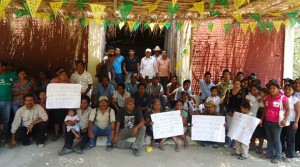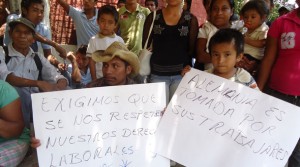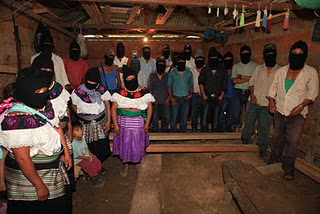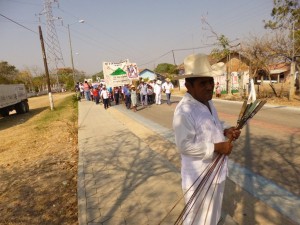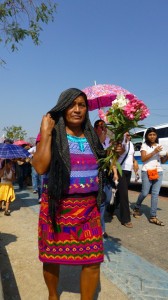
News
Asesinan a ejidatario de la Otra Campaña (Sexta) en Bachajón
San Cristobal de Las Casas, Chiapas
April 25, 2013
Frayba Urgent Information Note
Ejidatario from The Other Campaign in Bachajón Chiapas is Murdered
The Centre for Human Rights condemns the assassination of Juan Vázquez Guzmán, former Secretary General of the adherents to the Other Campaign (La Sexta) in the ejido of San Sebastián Bachajón, who was noted for his active participation in the defense of Land and Territory against the government plunder of the Agua Azul Waterfalls and the imposition of the Toll Booth at the entrance.
According to information given to this Centre, on Wednesday April 24 at 23:00 pm persons unknown shot Juan Vázquez five times, killing him instantly.
Neighbors say that Juan was attacked just as he was arriving home, the attackers immediately fled in a red van, with a double cab, taking the road to the municipal headquarters of Sitalá, thus also having access to the roads to the municipalities of Ocosingo, Cancúc and Chilón.
Since 2007, Juan Vázquez had been active in the defense of the Land and Territory of San Sebastian Bachajónone, a situation for which they held an order for legal protection (amparo) which is currently being reviewed in the Third Collegiate Court, based in Tuxtla Gutiérrez, under case number 118/2013.
On April 17th the ejidatarios of San Sebastian Bachajón, adherents to the Other Campaign of the Sixth Declaration of the Lacandon Jungle, publicly denounced two that their Territory is being threatened by the official policy of territorial dispossession which is continuing under the current state government.
1 Video of the struggle for the defense of the Territory, available at: http://www.youtube.com/watch?feature=player_embedded&v=dcTspD7NKmY #!
2 See note and statement available at: http://sipaz.wordpress.com/2013/04/19/chiapas-adherentes-a-la-otra-campana-de-san-sebastian-bachajon-denuncian-despojo-e-impunidad/

(Español) Consolida impunidad en Guerrero liberación de policías ministeriales acusados en caso Ayotzinapa
– Decisión de jueces evidencia deficiencias en investigación conducida por Procuraduría General de Justicia del Estado de Guerrero.
– Familiares de Jorge Alexis y Gabriel deberán acudir a instancias internacionales ante la falta de efectividad de la justicia en Guerrero.
– Recibirá Relator de la ONU información sobre impunidad en ejecuciones extrajudiciales de Normalistas de Ayotzinapa.
COMUNICADO DE PRENSA
Chilpancingo, Guerrero a 23 de abril de 2013.- El día de hoy fueron liberados los dos elementos de la Policía Ministerial de la Procuraduría General de Justicia del Estado de Guerrero (PGJE) en contra de quienes se ejercitó acción penal por el homicidio de los estudiantes Jorge Alexis Herrera Pino y Gabriel Echeverría de Jesús, ejecutados extrajudicialmente el 12 de diciembre de 2011 en medio de un violento operativo policial con el que se respondió a una protesta estudiantil, en la ciudad de Chilpancingo, Guerrero.
La liberación de dichos servidores públicos se materializó después de que la Justicia Federal ordenara al Juez local a cargo del proceso que dictara un nuevo auto de formal prisión contra los elementos de la Policía Ministerial, por ser insuficientes las pruebas que en su momento presentó la Procuraduría guerrerense. Tras esta decisión, ningún servidor público estatal o federal enfrenta hoy un proceso penal por las graves violaciones a derechos humanos cometidas en contra de los estudiantes de la Normal Rural Raúl Isidro Burgos de Ayotzinapa, Guerrero, ocurridos el 12 de diciembre de 2011.
Es preciso recordar, que por estos hechos la Comisión Nacional de los Derechos Humanos (CNDH) ejercitó por primera vez su facultad para investigar mediante un procedimiento especial violaciones graves a derechos humanos. Precisamente, en la Recomendación 1 VG/2012 derivada de dicho procedimiento, el Ombudsman Nacional concluyó con base en su propio trabajo pericial que los proyectiles de arma de fuego que habían privado de su vida a los estudiantes habían sido disparados por elementos de la Policía Ministerial del Estado de Guerrero ubicados donde se encontraban quienes hoy fueron liberados;no obstante, la CNDH fue omisa en coadyuvar para que esas conclusiones fueran confirmadas en el ámbito penal.
La exoneración de los policías acusados del asesinato de Jorge Alexis y Gabriel comprueba que en Guerrero no hay justicia posible para las víctimas de graves violaciones a derechos humanos y que los órganos de procuración e impartición de justicia aseguran impunidad a quienes delinquen desde el poder.
La liberación de los policías imputados confirma los temores externados desde el inicio de las investigaciones por los organismos de derechos humanos y los familiares de las víctimas, en el sentido de que al haberse realizado las primeras diligencias por mandos involucrados en los hechos y por peritos carentes de independencia, a la postre los responsables se beneficiarían de la parcialidad de la Procuraduría General de Justicia del Estado de Guerrero, encabezada sucesivamente por Alberto López Rosas, Juan Manuel Herrera Campos y actualmente por la Procuradora Martha Elba Garzón.
Es preciso recordar que la desconfianza ante la actuación de las autoridades estatales en los hechos, se vio agravada, dado que fue público y notorio que la propia Procuraduría deliberadamente obstaculizó el esclarecimiento de los hechos al intentar construir una versión falsa de los mismos mediante la fabricación de imputaciones contra los estudiantes, lo que incluyó la siembra de evidencia. Pese a que los familiares de Jorge Alexis y Gabriel, junto con los estudiantes de la Normal Rural de Ayotzinapa acudieron ante la justicia a aportar elementos para la sanción de los responsables, poniendo en riesgo su vida y la de sus representantes legales, hoy esos temores se ven confirmados y permiten constatar la quiebra absoluta del sistema de justicia guerrerense.
En ese sentido, como ocurre a menudo en Guerrero, sólo queda a los familiares de las víctimas acudir a las instancias internacionales para buscar la justicia que en nuestro país se niega a quienes son agraviados por agentes estatales. En ese sentido, la impunidad por la muerte de Jorge Alexis y Gabriel será denunciada los próximos días ante el Relator sobre Ejecuciones Extrajudiciales, Sumarias y Arbitrarias de la ONU, que visitará oficialmente el estado de Guerrero, y posteriormente ante el Sistema Interamericano.
En virtud de las recientes decisiones judiciales, las violaciones a derechos humanos cometidas el 12 de diciembre de 2011 en contra de los estudiantes de la Normal Rural Raúl Isidro Burgos, de Ayotzinapa, Guerrero, se suman a la larga lista de violaciones de derechos humanos cometidas contra las y los guerrerenses que han sido encubiertas desde el poder, como ocurrió con los crímenes cometidos durante la Guerra Sucia o con las masacres de El Charco y Aguas Blancas. Hoy, ni la tortura, ni las ejecuciones extrajudiciales, ni los tratos crueles, ni las detenciones arbitrarias de los estudiantes son motivo suficiente para que existan procesos penales contra los responsables. Por ello, la impune represión del 12 de diciembre de 2011 marcará a perpetuidad al gobierno de Ángel Aguirre Rivero exhibiéndolo como continuador de los esquemas de ejercicio autoritario de poder que durante décadas han agraviado a la población guerrerense.
En un contexto estatal convulso, marcado por la desesperación ciudadana ante la inseguridad y por un conflicto magisterial que trasciende hacia un movimiento popular de indignación, la consolidación de la impunidad en el caso Ayotzinapa confirma y muestra el grave deterioro de las instituciones públicas guerrerenses y la complicidad del sistema de justicia con quienes abusan y delinquen desde el poder.
Considerando este degradado contexto y sabiendo que los familiares de Jorge Alexis y Gabriel no cejarán en su búsqueda de justicia, acompañados por Tlachinollan, la Red Guerrerense de Organismos Civiles de Derechos Humanos, el Centro José María Morelos y el Comité Estudiantil de la Normal Rural de Ayotzinapa, expresamos nuestra preocupación ante las represalias que pueden desencadenarse con la liberación de los policías ministeriales imputados y responsabilizamos al gobierno de Ángel Aguirre Rivero de cualquier agresión cometida en contra de los familiares de Jorge Alexis y Gabriel o en contra de sus representantes.
